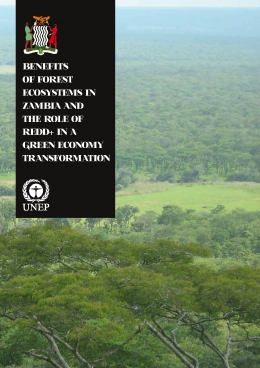Benefits of Forest Ecosystems in Zambia and the Role of REDD+ in a Green Economy Transformation
Zambia’s forest ecosystemsc ontribute US$ 1.3 billion, roughly 6.3 per cent of gross domestic product (GDP), to the national economy, further highlighting the crucial role forests can play in the global transition to a green economy, according to a new UNEP study.
The report goes beyond elements already counted as value added in Zambia’s Gross Domestic Product (GDP)—for example, wood products—to consider regulating, supporting and cultural services such as eco-tourism, erosion control and sediment retention, pollination and carbon storage.
Looking exclusively at these additional services, the study found they are worth US$ 515 million per annum, or around 2.5 per cent of GDP. This means that forest services have been undervalued by between 40 and 68 per cent. The inclusion of these additional services elevates the contribution of forests from 3.8 per cent to around 6.3 per cent of the 2010 GDP. In addition, Zambia’s forests provide about 1.4 million jobs, supporting 60 per cent of rural Zambian households who are heavily dependent upon the use of natural resources to supplement or sustain their livelihoods.
According to 2009 figures, Zambia has the second highest per-capita deforestation rate in Africa and the fifth highest in the world. The main direct drivers of deforestation are charcoal production, agricultural and human settlement expansion, and illegal exploitation of timber. The report aims to help change this situation by informing policy decisions on forest management and the implementation of activities under its national REDD+ process.
This report provides an economic rationale for prioritizing REDD+ implementation by showing the significant economic benefits of doing so. Thus, the potential is great for the forestry sector to play a very important role in the country achieving its Vision 2030 goals.
The report finds that cost-effective ways of conserving and sustainably managing forests should be implemented to support growth consistent with the green economy, defined by UNEP as ‘an economy that results in improved human well-being and social equity, while significantly reducing environmental risks’. Ways to reduce deforestation and forest degradation include strengthening and enhancing the management and governance of forests at local levels, introducing measures to reduce urban demand for charcoal, enhancing livelihoods and income generating activities that support or rely upon forest conservation and maintenance, and increasing the sustainability and efficiency of agricultural practices.

